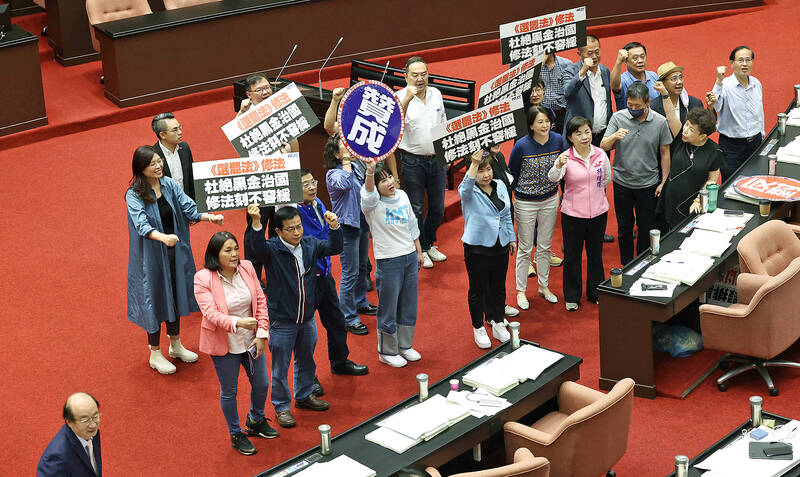The legislature yesterday passed amendments to electoral law that would bar people convicted of some crimes from running for office in perpetuity.
The third reading of amendments to the Civil Servants Election and Recall Act (公職人員選舉罷免法) would prevent people convicted of organized crime; money laundering; gun smuggling or use; narcotics trafficking, peddling and use; and national security crimes from running for public office.
Amendments to the Presidential and Vice Presidential Election and Recall Act (總統副總統選舉罷免法) were also passed yesterday.

Photo: CNA
The civil servants act amendment passed 56 to 30, with three abstentions.
The amendments were proposed by the Democratic Progressive Party (DPP) in response to multiple candidates in last year’s nine-in-one elections having criminal records.
However, the changes were opposed by opposition parties, which said they infringe on the right to participate in politics.
Those convicted of rebellion or collusion with foreign agents to instigate war in Taiwan would be banned from registering as candidates for public office, the amendments say.
Those who have received longer than a 10-year prison sentence, even if it can still be appealed, would also be barred from running for office, as well as those who have been removed from office due to disciplinary action.
Establishing an overarching standard risks infringing on the rights of people who have received heavy sentences for comparatively minor crimes, New Power Party Legislator Chiu Hsien-chih (邱顯智) said.
DPP Legislator Chuang Jui-hsiung (莊瑞雄) said that all parties involved had set a high bar for anti-corruption legislation, which hampered further discussion on the subject.
Some people might unwittingly allow others to access their bank accounts, which, in the event of criminal activity, could be seen as aiding and abetting money laundering, Chuang said.
“It would be very strange that they are then banned from running for public office for life,” he said.
Chiu said that the amendment limits who can participate in politics, a move that should be considered carefully in a democratic society.
Crimes that do not affect the operation of a democratic government should not be cited to ban people from running for public office for life, he said.
The Chinese Nationalist Party (KMT) said the amendments did not respect the input of opposition legislators, and the DPP’s success in passing the legislation highlights its arrogant governance.
Taiwan People’s Party Legislator Jang Chyi-lu (張其祿) said the amendments risk legislative overreach, and urged authorities to prepare contingency measures in the event of controversial enforcement.
Premier Chen Chien-jen (陳建仁) said that elected officials oversee the government and should be held to a higher standard in terms of eligibility, adding that a candidate with a criminal background should not be tolerated.
Former president Chen Shui-bian (陳水扁), who has been convicted of money laundering and bribery, on Thursday accused DPP caucus whip Ker Chien-ming (柯建銘), who backed the amendments, of contravening the Constitution and upending democracy due to his support of Vice President William Lai (賴清德) as a presidential candidate.
“To protest with one’s own life is a resigned, last-ditch resort from those whose conscience is deadened and numb,” he wrote on Facebook.

MAKING WAVES: China’s maritime militia could become a nontraditional threat in war, clogging up shipping lanes to prevent US or Japanese intervention, a report said About 1,900 Chinese ships flying flags of convenience and fishing vessels that participated in China’s military exercises around Taiwan last month and in January last year have been listed for monitoring, Coast Guard Administration (CGA) Deputy Director-General Hsieh Ching-chin (謝慶欽) said yesterday. Following amendments to the Commercial Port Act (商港法) and the Law of Ships (船舶法) last month, the CGA can designate possible berthing areas or deny ports of call for vessels suspected of loitering around areas where undersea cables can be accessed, Oceans Affairs Council Minister Kuan Bi-ling (管碧玲) said. The list of suspected ships, originally 300, had risen to about

DAREDEVIL: Honnold said it had always been a dream of his to climb Taipei 101, while a Netflix producer said the skyscraper was ‘a real icon of this country’ US climber Alex Honnold yesterday took on Taiwan’s tallest building, becoming the first person to scale Taipei 101 without a rope, harness or safety net. Hundreds of spectators gathered at the base of the 101-story skyscraper to watch Honnold, 40, embark on his daredevil feat, which was also broadcast live on Netflix. Dressed in a red T-shirt and yellow custom-made climbing shoes, Honnold swiftly moved up the southeast face of the glass and steel building. At one point, he stepped onto a platform midway up to wave down at fans and onlookers who were taking photos. People watching from inside

Japan’s strategic alliance with the US would collapse if Tokyo were to turn away from a conflict in Taiwan, Japanese Prime Minister Sanae Takaichi said yesterday, but distanced herself from previous comments that suggested a possible military response in such an event. Takaichi expressed her latest views on a nationally broadcast TV program late on Monday, where an opposition party leader criticized her for igniting tensions with China with the earlier remarks. Ties between Japan and China have sunk to the worst level in years after Takaichi said in November that a hypothetical Chinese attack on Taiwan could bring about a Japanese

STREAMLINED: The dedicated funding would allow the US to transfer equipment to Taiwan when needed and order upgraded replacements for stockpiles, a source said The US House of Representatives on Thursday passed a defense appropriations bill totaling US$838.7 billion, of which US$1 billion is to be allocated to reinforcing security cooperation with Taiwan and US$150 million to replace defense articles provided to the nation. These are part of the Consolidated Appropriation Act, which the US House yesterday passed with 341 votes in favor and 88 against. The act must be passed by the US Senate before Friday next week to avoid another government shutdown. The US House Committee on Appropriations on Monday unveiled the act, saying that it allocates US$1 billion for the Taiwan Security Cooperation Initiative